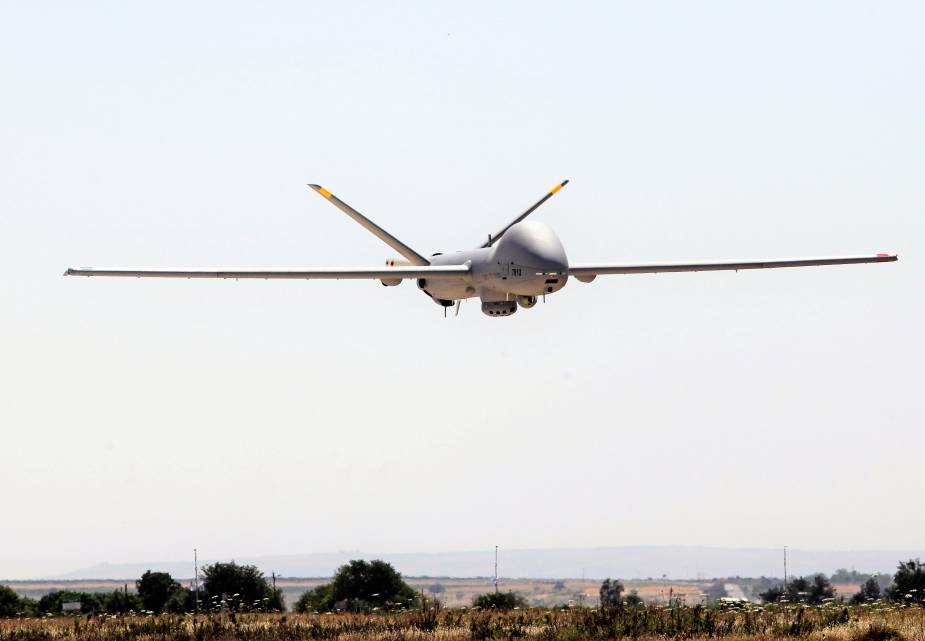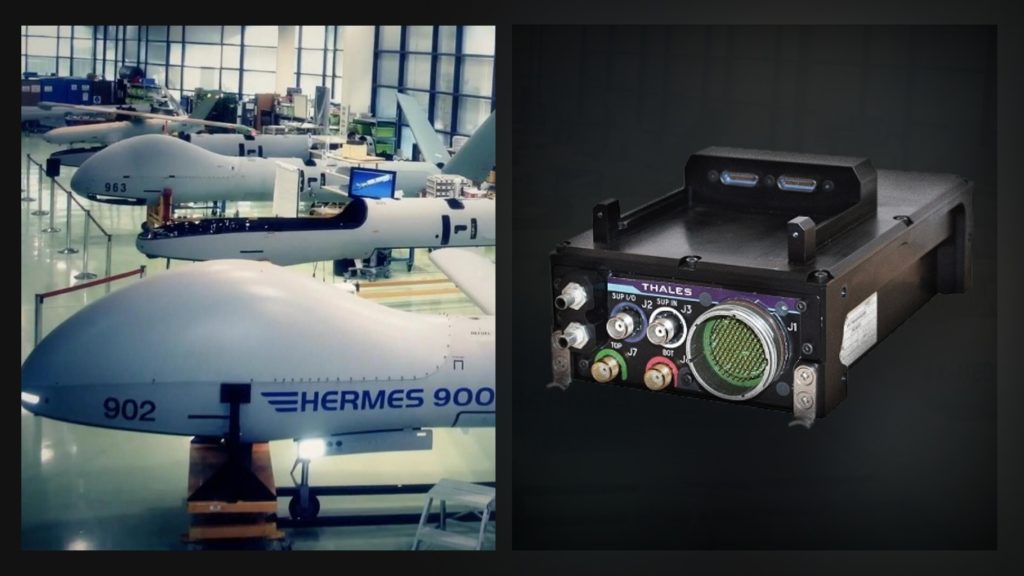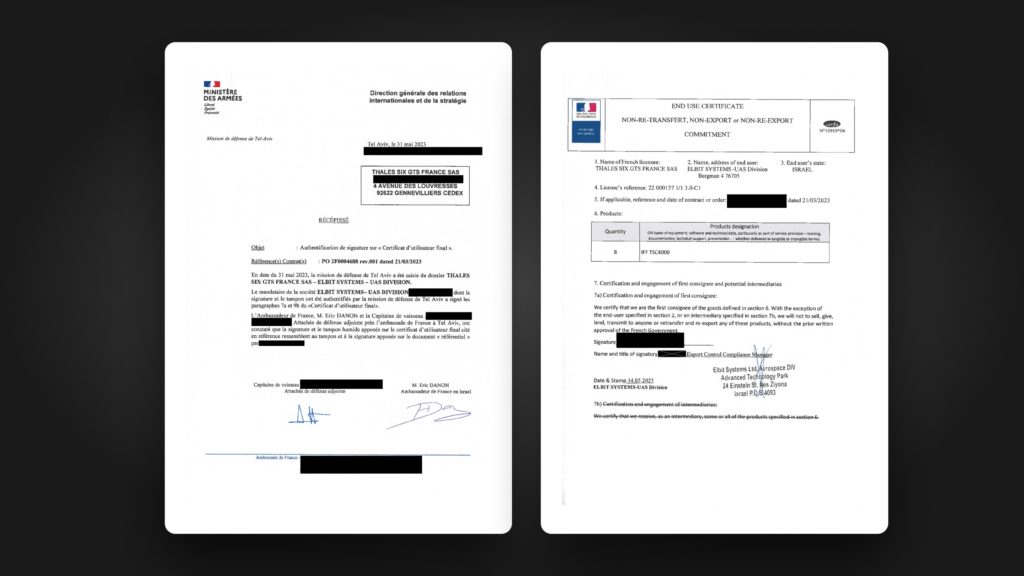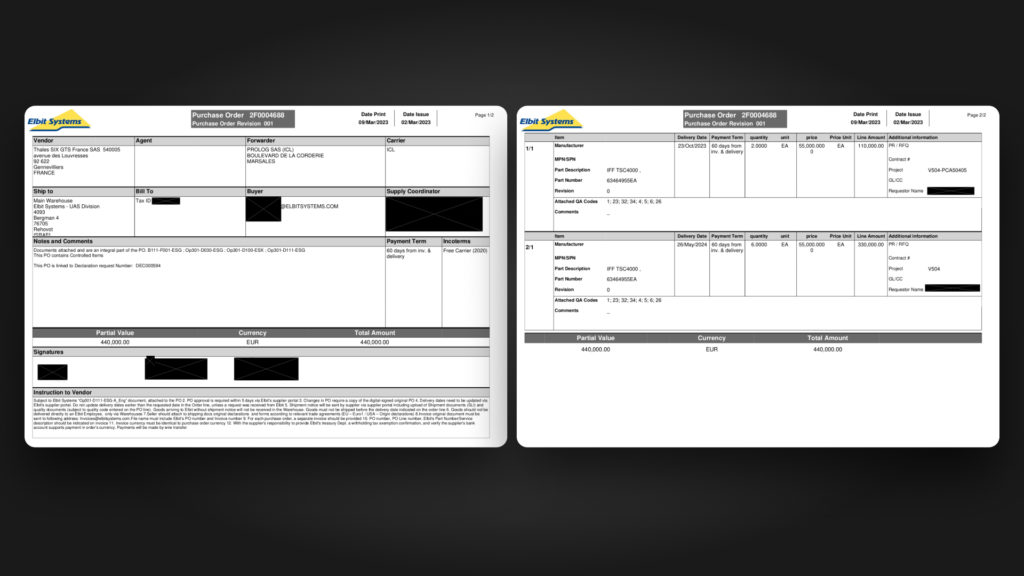The French government has authorised the delivery in Israel of electronic equipment for drones suspected of bombing civilians in Gaza. Disclose can reveal with supporting confidential documents that the most recent shipment of war material manufactured by French firm Thales was supposed to take place on 26 May 2024.

“The drone in the sky is very loud, so loud that it drowns out our voices,” Palestinian journalist Hind Khoudary wrote on X in December 2023. Six months later, in June 2024, as an Israeli airforce raid hit the town of Rafah and the Al-Maghazi camp, the freelance journalist once again reported the presence of drones: “They are so loud that my heart is drowning.” A woman answered her that she lived in the Al-Maghazi camp and that she couldn’t sleep because of the unmanned aircraft. “It is a continuous Zzzzzz,” she added.
Since the start of the offensive against Hamas on 13 October 2023, the Israeli armed forces have taken their fleet of unmanned aerial vehicles – UAVs, or drones – out of military hangars. Their use is “the story of this war,” said the Israeli lieutenant-colonel in charge of drone battalion 166, also known as the Firebird Squadron, in an interview with news outlet Israel Defense. The mission of the elite drone fleet is to monitor Gazan territory, reconnoiter targets and fire. By compiling several NGO reports and statements from the Israeli armed forces, Disclose has listed at least eight deadly strikes by Israeli drones against civilians and infrastructure in Gaza since October 2023. https://flo.uri.sh/visualisation/18422552/embed
The Hermes 900 is one of Squadron 166’s main “firebirds”. Its long wings are its distinctive feature. It is capable of flying for over 30 hours at an altitude of about 9,000 metres.
Thales equips Hermes 900 drones
To manoeuvre the state-of-the-art device, pilots sit behind a wall of screens, sometimes several hundred kilometres from the operational area. From there, they can strike at will. Some bombs “can take out the driver of a vehicle, leaving the person in the backseat alive. Others have a kill radius of five to 10 metres,” a Hermes 900 pilot told British daily The Telegraph. The head of Squadron 166 himself has admitted targeting directly the hospital in Khan Younis in the southern Gaza Strip in February. The Israeli armed forces spokesperson, contacted by Disclose, was not able to confirm that this strike had taken place.

Although Hermes 900 aircraft are currently being used to bomb Gaza, the Thales group, in which the French state has a 26% stake, recently delivered electronic equipment used in the construction of these armed drones, as revealed in a dozen confidential documents obtained by Disclose. According to the documents from France’s arms industry leader – including receipts and a commercial catalog – , the armed forces ministry and Elbit Systems – the Israeli manufacturer of the Hermes 900 – the equipment in question is a TSC 4000 IFF transponder. The war equipment, classified by the armed forces ministry as “surveillance, target tracking and reconnaissance systems,” enables Israeli drones to avoid any risk of collision and firing between “friendly” aircraft.
At least eight of these transponders were supposed to be flown to Israel between December 2023 and the end of May 2024. That’s several months after the first aerial bombings. Two transponders were delivered in 2024, Thales confirmed to Disclose. The other six are reported to have been stopped by French customs.

The export licence for this communication equipment used to equip killer drones, approved by the upper reaches of power, provides more evidence of the lack of transparency and monitoring in relation to arms sales. Since the start of the Israeli offensive, the French armed forces ministry claims it has behaved impeccably. On 20 February Minister Sebastien Lecornu answered a written question from an Unbowed France MP about arms deliveries to Israel, saying that “equipment exported [to Israel] does not include weapons as such but basic components to which the interministerial commission that authorises or prohibits arms exports, the CIEEMG, pays particular attention depending on the equipment into which they are to be integrated”. He failed to point out that the government has allowed out of the country some Thales equipment used to equip drones involved in the offensive in Gaza.
He also kept silent about the fact that the government had approved the delivery of spare parts used to assemble rounds of ammunition for machine guns, as revealed by Disclose. Once this was made public, the minister defended himself without providing the slightest evidence, arguing that these “links” were supposed to be “re-exported to other countries”. This time, the French state cannot hide behind such an argument.
As a matter of fact, the non-re-export contract drawn up by the armed forces ministry’s Directorate General for International Relations states that the eight TSC 4000 IFF transponders are to be “neither sold, gifted, leased nor transformed without the prior agreement of the French government”: they can only be “integrated” into products manufactured by the Israeli company. To ensure that the transponders would not leave the country, Eric Danon, the then French ambassador to Israel, went so far as to check that the signature on the document was genuine. “The signature and the wet stamp on the end-user certificate are similar to those” of Elbit Systems’ export controller, he wrote in a report dated 31 May 2023. The former ambassador, contacted by Disclose, did not answer our questions.

The French state cannot claim either that the transponders sold by Thales can be used as “components for the Iron Dome”. Since the start of the war between the state of Israel and Hamas, the armed forces minister has argued that the only military equipment exports authorised by France are for Israel’s missile defense system, “so rockets do not rain down on Israeli citizens,” he explained on 14 May.
Hospital attack
The story of the secret contract between France and Israel began on 2 March 2023, when Elbit Systems, the Israeli arms industry leader and manufacturer of the Hermes 900, placed an order with Thales Six GTS, the telecommunications subsidiary of the Thales group. The Israeli company wished to buy eight TSC 4000 IFF transponders from the French firm for €55,000 per unit, i.e. for a total of €440,000. A first delivery of two transponders was scheduled for 23 October 2023 but delays at Thales meant that the two transponders only left the group’s factory in Laval on 17 November 2023, several weeks after the start of the offensive against Hamas. Despite the fact that the UN had been warning for several days that “women and newborns are bearing the brunt of the conflict,” it seemed that nothing could prevent the contract from being duly carried out.
On 5 December, the documents required for a first delivery were ready. At Charles de Gaulle airport, two transponders were loaded onto an aircarft chartered by Prolog, a company specialising in “confidential transport classified as a top-secret defense matter,” according to its website. The cargo was bound for the Elbit Systems site in Rehovot, a city about 20 km from Tel Aviv international airport, according to an invoice issued by the company. Rehovot is precisely where Hermes 900 drones are built, according to a Reuters report. The remaining six transponders were due to be shipped to Israel on May 26, 2024. However, according to our information, the parcels are currently blocked at Roissy-Charles-de-Gaulle airport, due to the lack of customs authorization.

Elbit Systems declined to answer Disclose’s questions. The CEO of the shipping company Prolog would not give details about their contract with Thales, saying only that “shipments for our clients and their outcome is confidential business information”. Their client are adamant that they “have delivered to Israeli forces or Israeli industrialists no lethal equipment and no other equipment ensuring the functioning of a lethal system”.
Given the nature of the electronic components sold by Thales to Elbit Systems and their use, Armed Forces Minister Sebastien Lecornu should have suspended the export license to Israel as soon as he was aware of “attacks directed against civilians or civilian objects” as required by the arms trade treaty France signed in 2014, especially since the armed forces ministry services reviewed all export licenses to Israel at the end of 2023, according to Le Monde. They are reported to have decided to suspend shipments of “components that could be used to manufacture artillery shells”. When contacted repeatedly about the minister’s decision to let the transponders through, the offices of the prime minister and of the armed forces minister declined to answer Disclose’s questions.
The government’s stance, as ambiguous as it may be, does not seem to be cast in stone. According to a customs source, no ML5-classified war equipment such as Thales TSC 4000 IFF can be delivered to Israel: their export licences have been suspended on the quiet.
This about-face can be far-reaching. Until 13 April, the government was very eager to protect ML5-classified military goods exports. In a memo to the Paris administrative court after Amnesty International brought a complaint to suspend the export of ML5-classified goods including Thales transponders, the ministry’s Director of Legal Affairs wrote that such a ban “would not fail to have a profound impact on bilateral relations with [Israel]”. According to the senior civil servant, it would “likely have an effect on the balance of regional and international geostrategic relations”. Her arguments were taken up word for word by the administrative judge. But the pressure exerted by NGOs and civilian society may well have finally triumphed, which goes to prove that equipment delivered by France may be used by Israeli armed forces to commit war crimes in Gaza.
Investigation: Ariane Lavrilleux and Mathias Destal
Edition: Pierre Leibovici
Translation: Béatrice Murail
